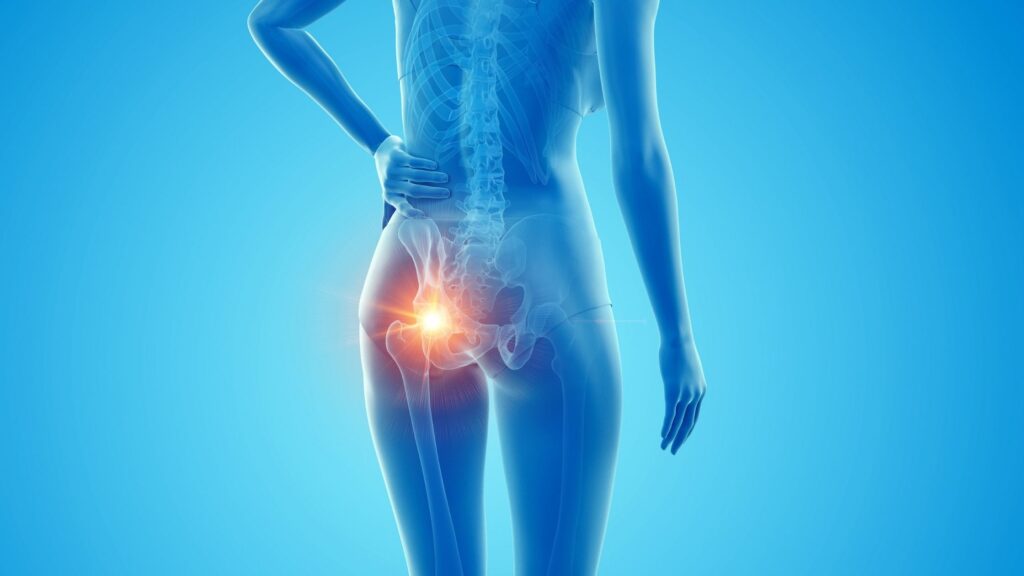Hip injuries can be debilitating, impacting your mobility and overall quality of life. Whether you’re an athlete sidelined by a sports injury or experiencing hip pain due to age-related conditions, effective treatment starts with understanding your condition. Dr. Brian Capogna offers comprehensive, patient-centered care for hip injuries, focusing on accurate diagnosis, personalized treatment plans, and a holistic approach to recovery.
In this guide, we’ll walk you through each stage of hip care, from initial consultation to a full return to your active lifestyle.
Understanding Hip Injuries
The hip is a complex joint, essential for everyday movements like walking, sitting, and running. Given its importance, injuries to the hip can range from mild strains to severe conditions requiring surgical intervention.
Common Causes of Hip Pain
- Osteoarthritis: Wear-and-tear damage to cartilage that cushions the hip joint, leading to pain and stiffness.
- Labral Tears: Injuries to the cartilage that lines the socket of the hip joint, often caused by trauma or repetitive motion.
- Bursitis: Inflammation of the fluid-filled sacs (bursae) that cushion the hip, resulting in pain during movement.
- Tendonitis: Overuse injuries that cause inflammation in the tendons around the hip.
- Fractures: Often due to falls or high-impact trauma, hip fractures are particularly common in older adults.
- Impingement: A condition where abnormal bone growth in the hip joint leads to pain and limited range of motion.
Stage 1: Diagnosis of Hip Injuries
The first step to recovery is pinpointing the exact cause of your hip pain. At our Long Island office, Dr. Capogna combines advanced imaging technology with a thorough physical examination to identify the underlying problem.
What to Expect During Your Diagnosis
- Medical History: Understanding your symptoms, activity level, and any prior injuries.
- Physical Exam: Assessing range of motion, strength, and areas of tenderness.
- Diagnostic Imaging: X-rays, MRIs, or CT scans may be recommended to provide a detailed view of the hip joint and surrounding structures.
This precise diagnosis forms the foundation of a customized treatment plan tailored to your needs.
Stage 2: Personalized Treatment Plans
Every patient’s journey is unique, and your treatment plan will reflect your specific injury, lifestyle, and recovery goals. Dr. Capogna emphasizes minimally invasive techniques and holistic approaches whenever possible.
Non-Surgical Treatments
- Physical Therapy: A cornerstone of hip injury care, physical therapy strengthens the muscles supporting your hip and improves flexibility.
- Medications: Anti-inflammatory drugs or corticosteroid injections can reduce pain and swelling.
- Lifestyle Adjustments: Modifying activities, incorporating low-impact exercises, and focusing on weight management can alleviate stress on the hip joint.
Surgical Options
- Hip Arthroscopy: A minimally invasive technique to repair labral tears or address impingement.
- Total Hip Replacement: Recommended for severe arthritis or fractures, this procedure replaces the damaged hip joint with a prosthetic, restoring mobility and reducing pain.
- Fracture Fixation: Surgical repair of hip fractures to stabilize the joint and promote healing.
Each surgical plan is designed to minimize downtime and facilitate a smoother recovery.
Stage 3: Recovery and Rehabilitation
The recovery process is just as critical as the treatment itself. Dr. Capogna’s holistic approach ensures patients receive the care they need to regain full function and prevent future injuries.
What to Expect During Recovery
- Early Mobility: After most procedures, you’ll begin physical therapy shortly after surgery to improve mobility and reduce stiffness.
- Strength Training: As you progress, exercises will focus on rebuilding strength and stability in the hip and surrounding muscles.
- Ongoing Monitoring: Regular follow-ups ensure your recovery is on track, and any adjustments can be made to your treatment plan.
Dr. Capogna also provides guidance on returning to sports or other high-impact activities, tailoring your rehabilitation to meet your specific goals.
Holistic Care for Long-Term Health
Dr. Capogna believes in treating the whole patient, not just the injury. This philosophy extends beyond immediate recovery to include strategies for long-term hip health.
Preventing Future Hip Issues
- Core and Hip Strengthening: Regular exercises to maintain muscle balance and joint stability.
- Flexibility Training: Yoga or stretching programs to keep the hip joint mobile.
- Ergonomic Adjustments: Modifying your workspace or sports techniques to reduce stress on the hip.
By focusing on prevention, we aim to help patients avoid re-injury and maintain an active, pain-free lifestyle.
Why Choose Dr. Capogna for Hip Care?
With advanced training in minimally invasive techniques and a patient-first approach, Dr. Capogna is dedicated to providing the highest standard of orthopedic care. Whether you’re dealing with a recent injury or managing chronic hip pain, his expertise ensures you’ll receive the personalized attention you deserve.
From your initial orthopedic consultation in New York to the final stages of recovery, Dr. Capogna is with you every step of the way.
Take the First Step Toward Recovery
If you’re experiencing hip pain, don’t wait to seek care. Early diagnosis and treatment are key to a faster, more effective recovery. Schedule an appointment with Dr. Brian Capogna today to explore your options and start your journey toward better hip health.
Give us a call at 516-524-0000 or visit briancapognamd.com to learn more about comprehensive care for hip injuries.
People Also Ask
What are the common causes of hip pain?
Hip pain can result from osteoarthritis, labral tears, bursitis, tendonitis, fractures, or impingement. Each condition requires specific treatment for optimal recovery.
How are hip injuries diagnosed?
Hip injuries are diagnosed through a combination of medical history, physical examination, and imaging tests like X-rays or MRIs to identify the root cause of pain.
What treatments are available for hip injuries?
Treatments range from physical therapy and anti-inflammatory medications to advanced procedures like hip arthroscopy or total hip replacement, depending on the severity of the condition.
How long does recovery take after hip surgery?
Recovery timelines vary based on the procedure and individual factors but typically involve several weeks of physical therapy and gradual strengthening over months.

